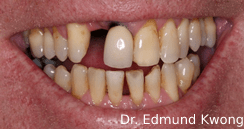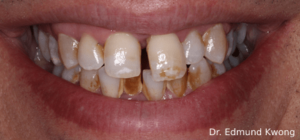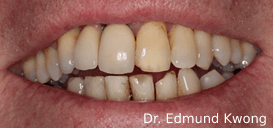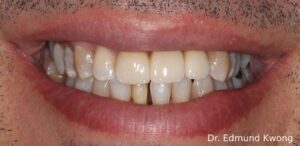Dental Bridges
For replacing one or more missing teeth, dental bridges are an effective solution. These bridges consist of an artificial tooth supported by the adjacent natural teeth. Custom-built to ensure a perfect fit, bridges can also be made from durable materials such as porcelain or metal.
At SIA Dental Burwood, we expertly craft dental bridges to seamlessly fill gaps, using all-porcelain materials for a natural and beautiful look. Ready for a transformation? Call us at (03) 8538 6199 or book an online appointment.
What to expect at SIA Dental Bridges procedure?
At SIA Dental Burwood, dental bridge treatment is typically placed over two appointments. During the first visit, the teeth adjacent to the missing tooth are carefully prepared and sculpted to precise measurements. These teeth will receive crowns, which serve as anchors for the bridge. Next, an impression of your teeth is taken and sent to a local lab to custom-make the bridge. To ensure the bridge matches your natural teeth, our dentists or dental ceramists will select the appropriate shade.
While the permanent bridge is being crafted, a temporary bridge or crowns are placed to protect your teeth and maintain function. At the second appointment, the temporary bridge and crowns are removed, and the custom-made permanent bridge is securely cemented in place. Before the final placement, you’ll have the opportunity to review the color and shape of the bridge to ensure it meets your expectations.
We have successfully completed dental bridge procedures in the following cases:
Before

Case 1: A traumatized upper right lateral incisor was lost.

Case 2: Due to advanced gum disease, the upper left central incisor became misaligned.
After

Results: We replaced it with a partial Maryland bridge, securely attached to the adjacent canine tooth.

Results: We restored this tooth with a traditional three-piece bridge, anchored to the neighboring teeth for stability and function.
FAQs about Dental Bridges
Why might I need a dental bridge?
You might need a dental bridge if you have one or more missing teeth. Replacing missing teeth is important to:
- Restore your smile
- Maintain the shape of your face
- Prevent remaining teeth from drifting out of position
- Restore the ability to chew and speak properly
- Distribute bite forces evenly
Are you looking for dental bridge services? SIA Dental Burwood is open 6 days a week. Talk to our friendly receptionist today at (03) 8538 6199 or easily book online.
What are the different types of dental bridges?
There are four main types of dental bridges:
- Traditional bridges: Consist of one or more artificial teeth (pontics) anchored by dental crowns on the adjacent teeth (abutments).
- Cantilever bridges: Used when there are adjacent teeth on only one side of the missing tooth or teeth.
- Maryland bridges (resin-bonded bridges): Use a metal or porcelain framework bonded to the back of the adjacent teeth.
- Implant-supported bridges: Anchored by dental implants rather than natural teeth.
How long do dental bridges last?
Dental bridges can last between 5 to 15 years or longer with proper care and maintenance. Good oral hygiene, regular dental check-ups, and avoiding habits that put excessive stress on the bridge can help extend its lifespan.
At SIA Dental Burwood, we work hard to use the best supplies and the most recent procedures. The effectiveness of your treatment is based on a number of variables that differ from person to person, and it can occasionally be challenging to give an exact duration for your treatment. Our dentists will discuss these factors with you during your consultation.
In general, we offer a 3-year warranty on our dental bridges as long as you come in for a routine dental checkup and cleaning every six to twelve months.
Does getting a dental bridge hurt?
The procedure to get a dental bridge typically involves local anesthesia to numb the area, so you should not feel pain during the preparation and placement. Some patients may experience mild discomfort or sensitivity afterward, which usually subsides within a few days.
